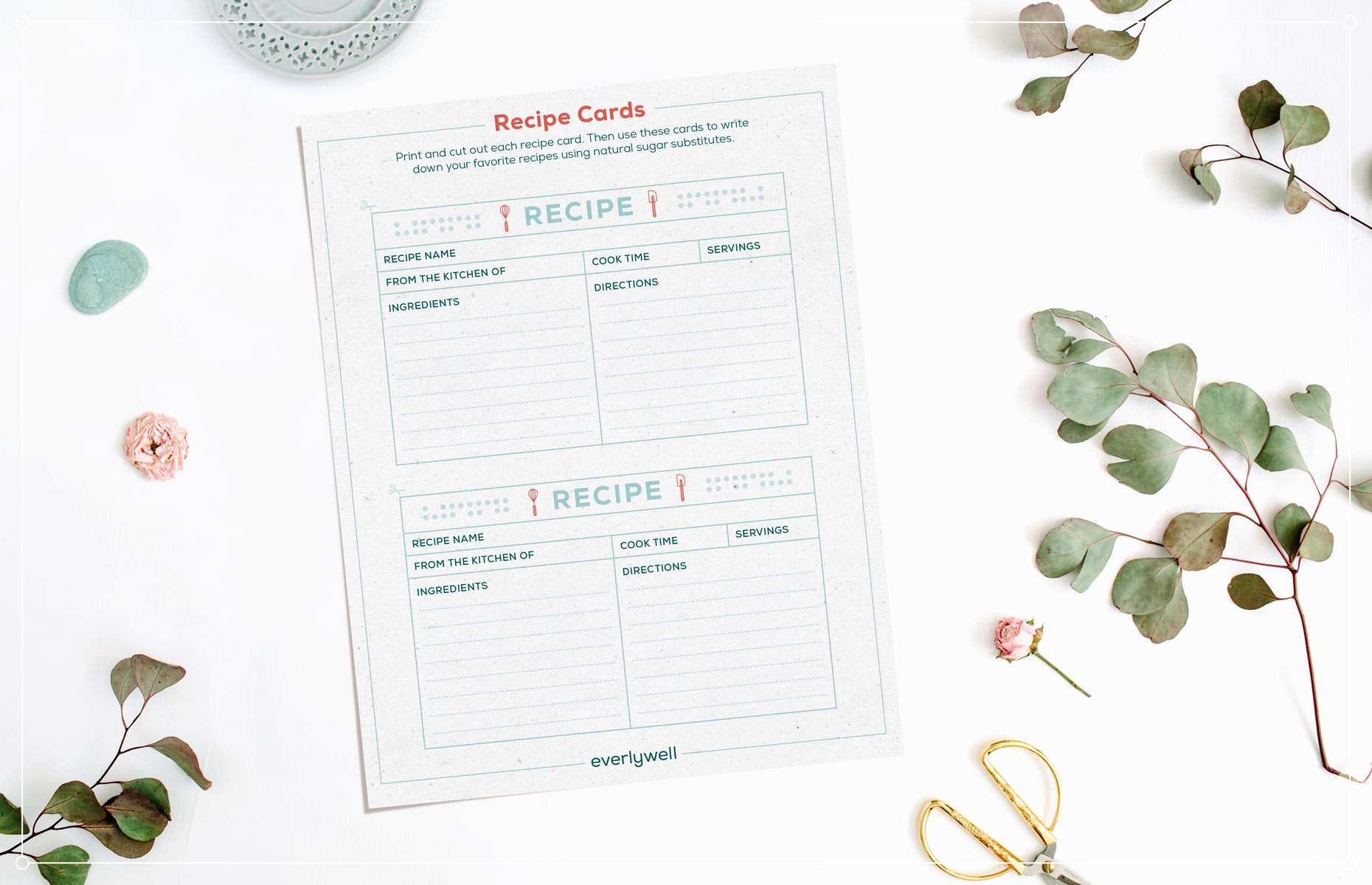
7 Best Sugar Substitutes for a Healthier Life
Sugar is everywhere, and it’s no secret that too much of it can have a negative impact on your health.
There are more than 37 million [1] Americans living with diabetes, including more than 8 million who are undiagnosed. Another 96 million [1] adults in the U.S. have prediabetes, a condition that leaves the average person with a 50 percent chance [2] of developing diabetes within the next decade. Type 2 diabetes is more common [3] in countries with high sugar intake.
For anyone who wants to watch their sugar intake — including those with diabetes — there are sugar substitutes or non-nutritive sweeteners that offer many of the same qualities as sugar with fewer drawbacks. If you’re looking to manage your blood sugar with more natural sweeteners, it’s always a good idea to discuss options with a registered dietitian or your healthcare provider.
Read on for recommendations about the seven best sugar substitutes that can enhance the taste of your food while you try to maintain optimal blood sugar levels. If you want, you can skip to our sugar substitute printables to see how you can use these alternative sweeteners in your kitchen.
1. Xylitol
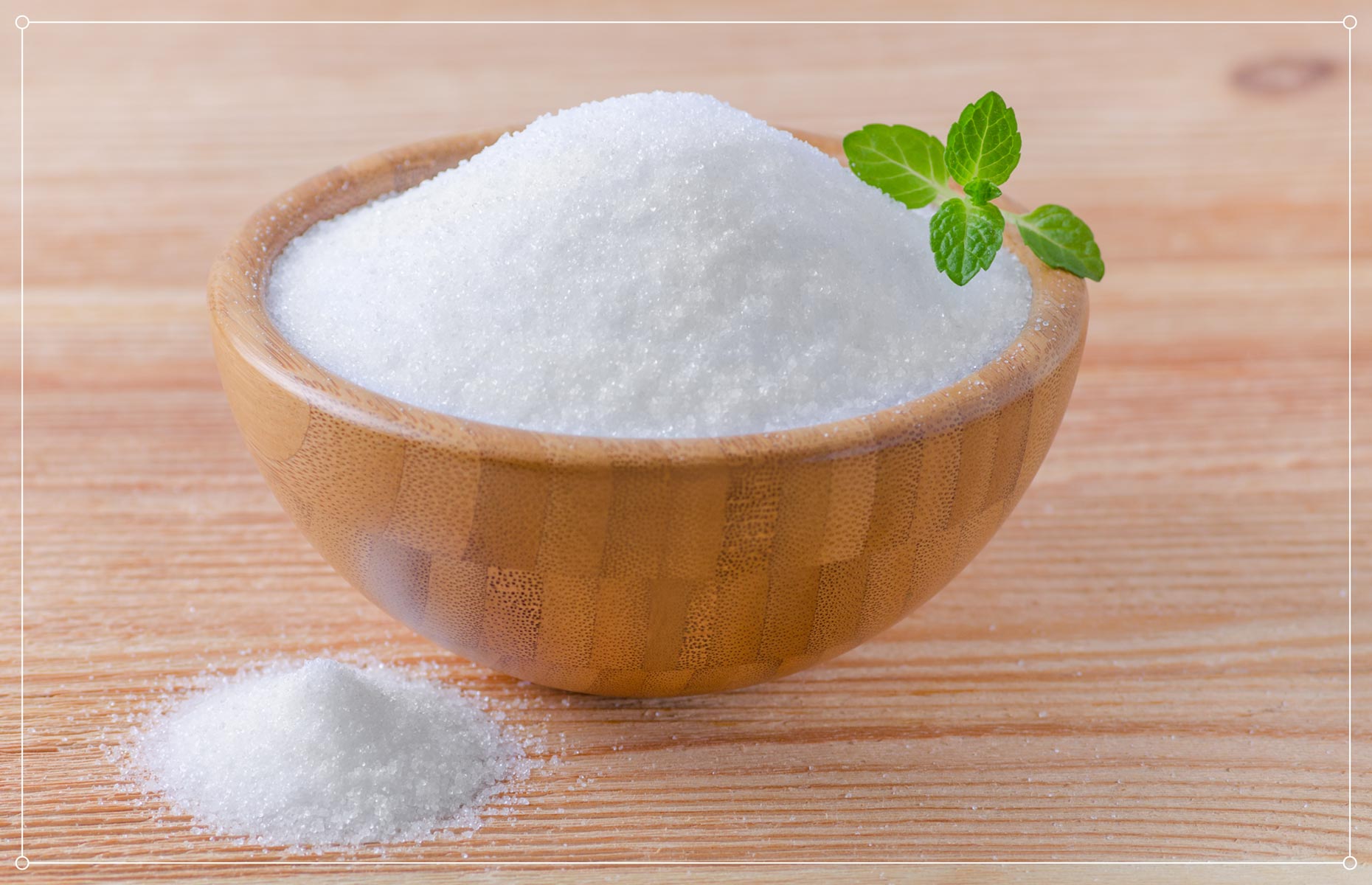
Xylitol is one of several sweeteners known as sugar alcohols. These sweeteners have a somewhat misleading name since they are not sugar or alcohol [4]. Since xylitol is about as sweet as sugar with fewer negative effects when used in moderation, it can make for an excellent substitute.
Xylitol can be naturally derived from fruits or vegetables, but it can also be synthesized. In either case, the benefits of xylitol over sugar are clear: It’s roughly as sweet as sugar but has half as many calories, and it’s less likely to lead to spikes in blood sugar [5].
One thing to be aware of with xylitol, however, is that it may lead to uncomfortable digestive symptoms [6] including bloating or nausea, so be mindful of how your body responds.
Great for: Avoiding blood sugar spikes while still adding sweetness
2. Erithritol
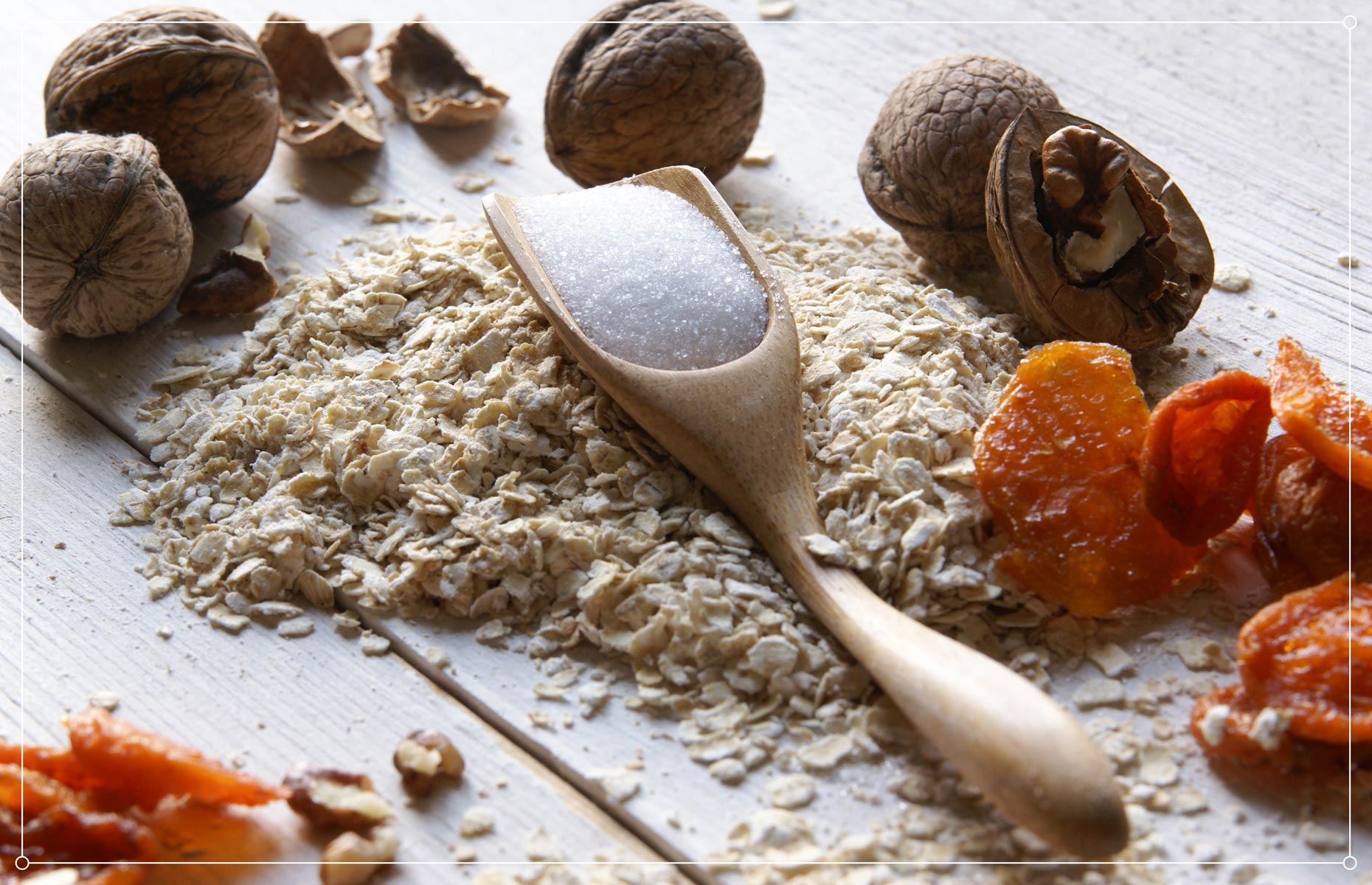
Erythritol is another sugar alcohol, similar to xylitol but with a slightly different taste and various benefits.
Unlike xylitol, erythritol seems to be more easily digested by the body, [7] leading to fewer gastrointestinal symptoms for those who use it as a sugar substitute. Additionally, researchers have found that erythritol may be a better sugar alcohol if you’re managing diabetes, [8] as it has no calories and could have positive effects on the cardiovascular system.
Great for: Avoiding the gastrointestinal symptoms associated with some other sugar alcohols
3. Stevia
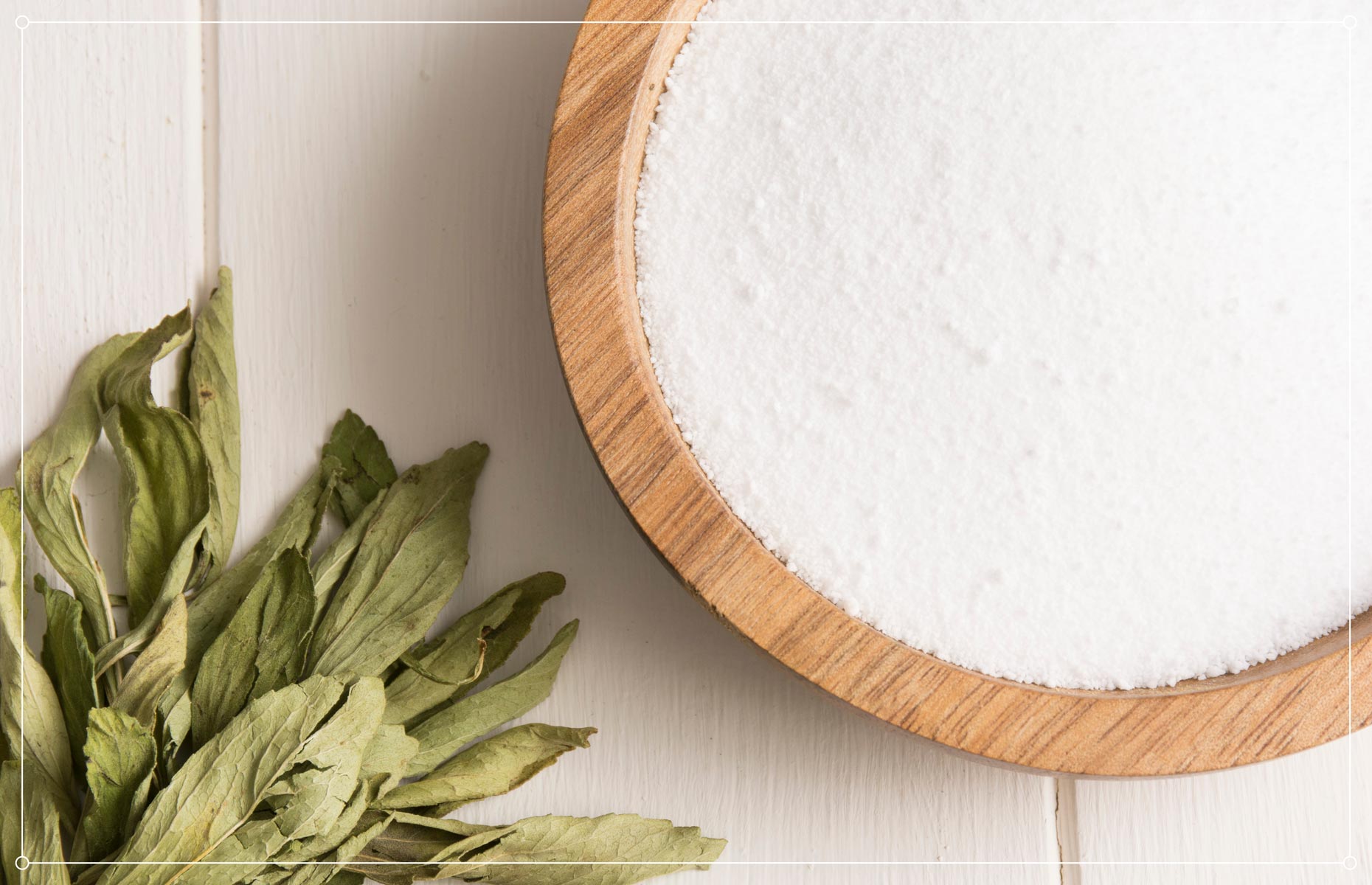
Stevia is a plant-based sweetener extracted from the leaves of Stevia rebaudiana, a South American shrub. Stevia’s sweet compounds are 150–300 times sweeter [9] than sucrose (table sugar), so you typically don’t have to use as much as table sugar in cooking to achieve a sweet flavor.
Sweeteners like stevia have been shown to have little or no effect on blood sugar levels, [10] making them a common choice for diabetics.
Studies suggest a sweet compound in stevia called stevioside may be related to to lower blood pressure, blood sugar, and insulin levels. [11]
Great for: A serious boost in sweetness with little effect on blood sugar
4. While Fruit or Purees
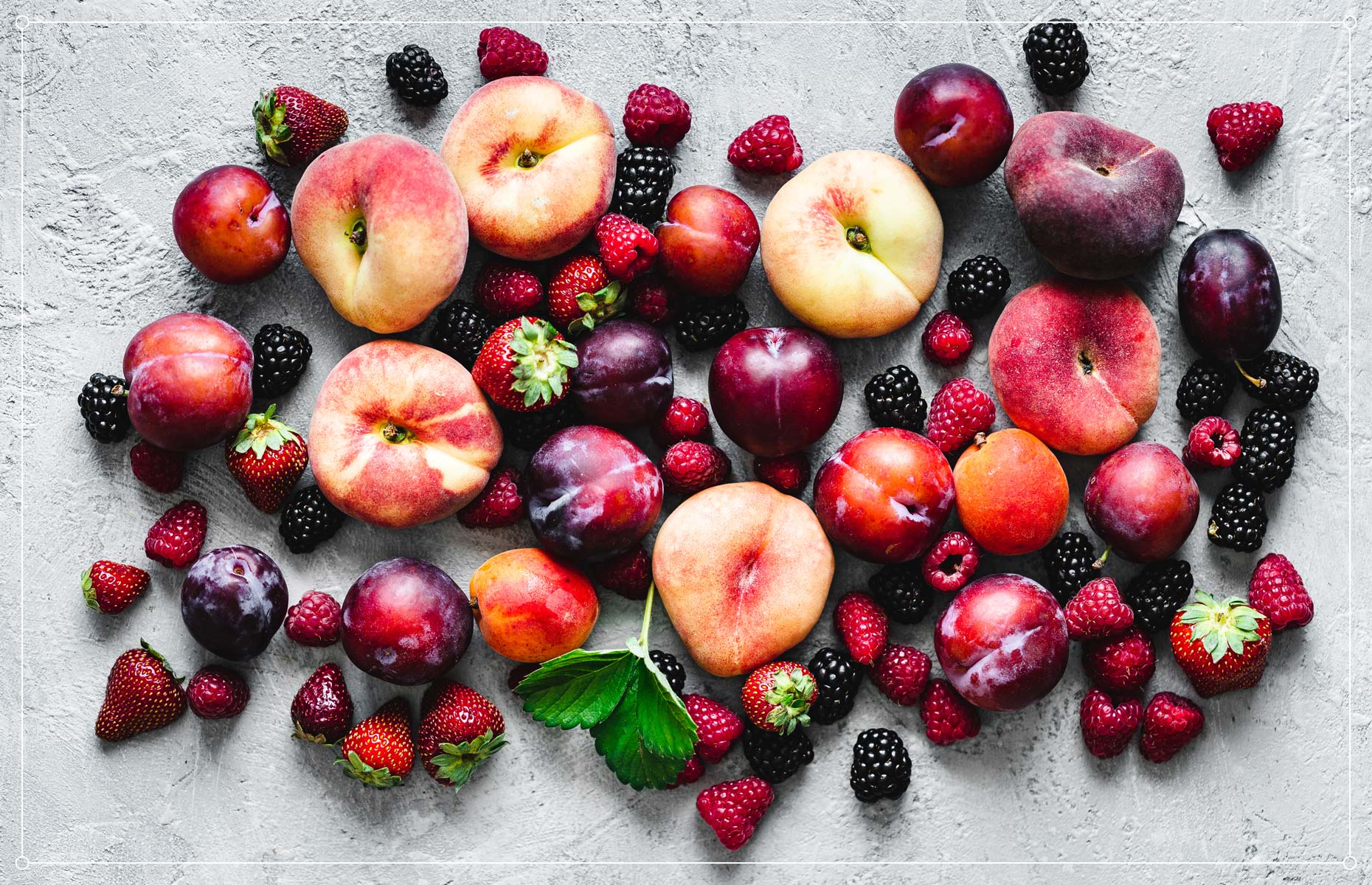
Fruits offer plenty of vitamins, minerals, and antioxidants — and can make a great natural sweetener, too. Since fruits are also high in fiber, [12] they are better for digestion, can slow blood sugar response, and keep you feeling full longer.
If you have diabetes or you’re prediabetic, aim to use high-fiber fruits such as blackberries, strawberries, or raspberries [13], which also contain antioxidants and several vitamins. The American Diabetes Association also recommends [14] choosing fruits that have a low glycemic index and staying mindful of portion sizes.
Be wary of fruit juices. Some dietitians [15] suggest that in the process of juicing, beneficial fibers are broken down and mostly lost when consumed in liquid form. The loss of dietary fiber in juices means that they can be absorbed more rapidly.
Great for: Adding fiber along with sweetness
5. Monk Fruit
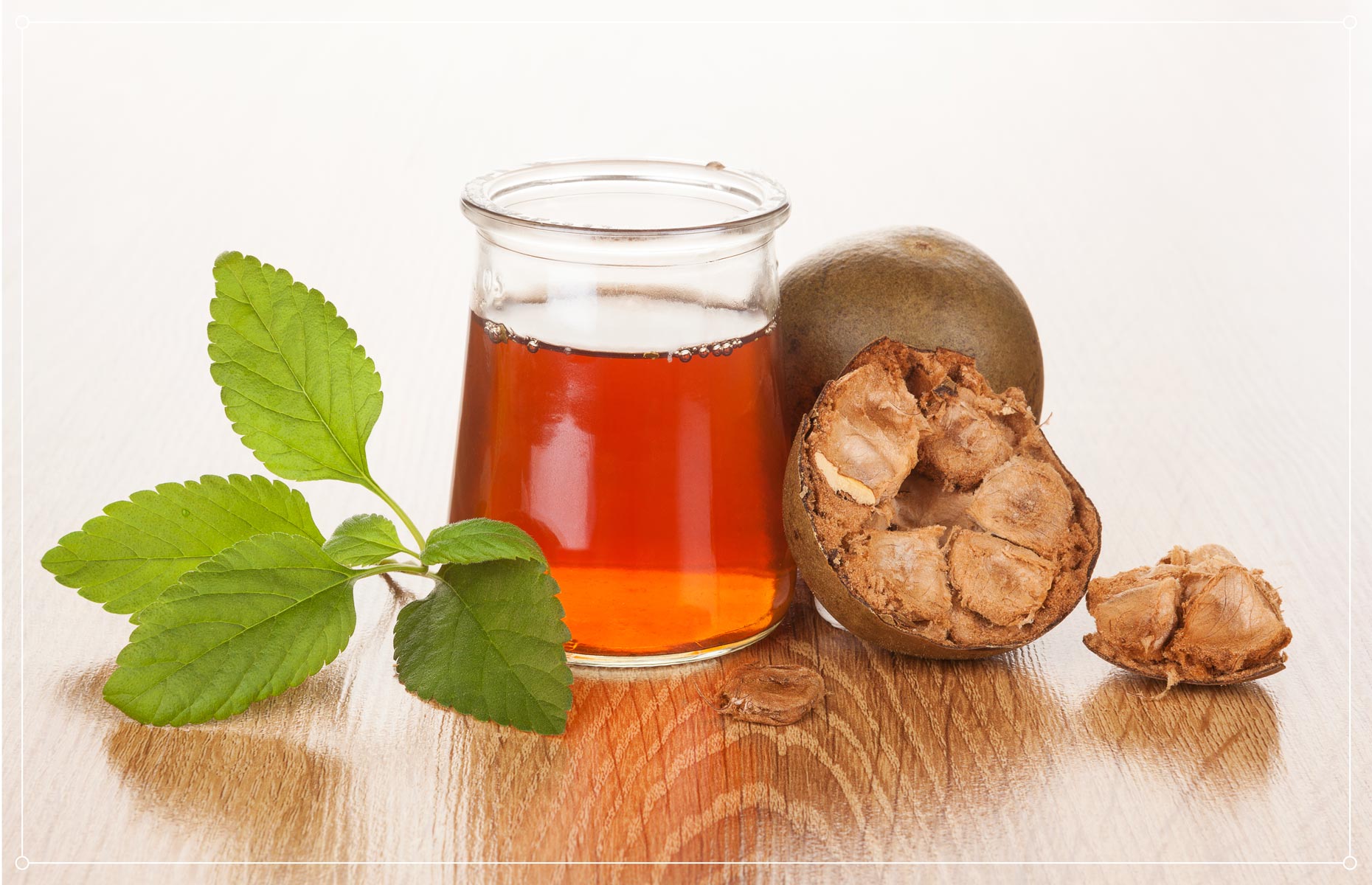
Monk fruit extract, also known as luo han guo, is native to the forests of southern China. Monk fruit is a great alternative to sugar, as it contains zero calories and is 100–250 times sweeter than sugar. [16]
Importantly, the safety profile of monk fruit has not yet been fully determined. Some scientists note [17] there is not sufficient research into the toxicity of monk fruit extract, but the FDA [18] reports no incidence of negative side effects.
Monk fruit extract is often mixed with other sweeteners, especially in beverages, so be sure to read the label before choosing any product containing monk fruit.
Great for: A zero-calorie alternative to sugar that’s still sweet
6. Yacon Syrup
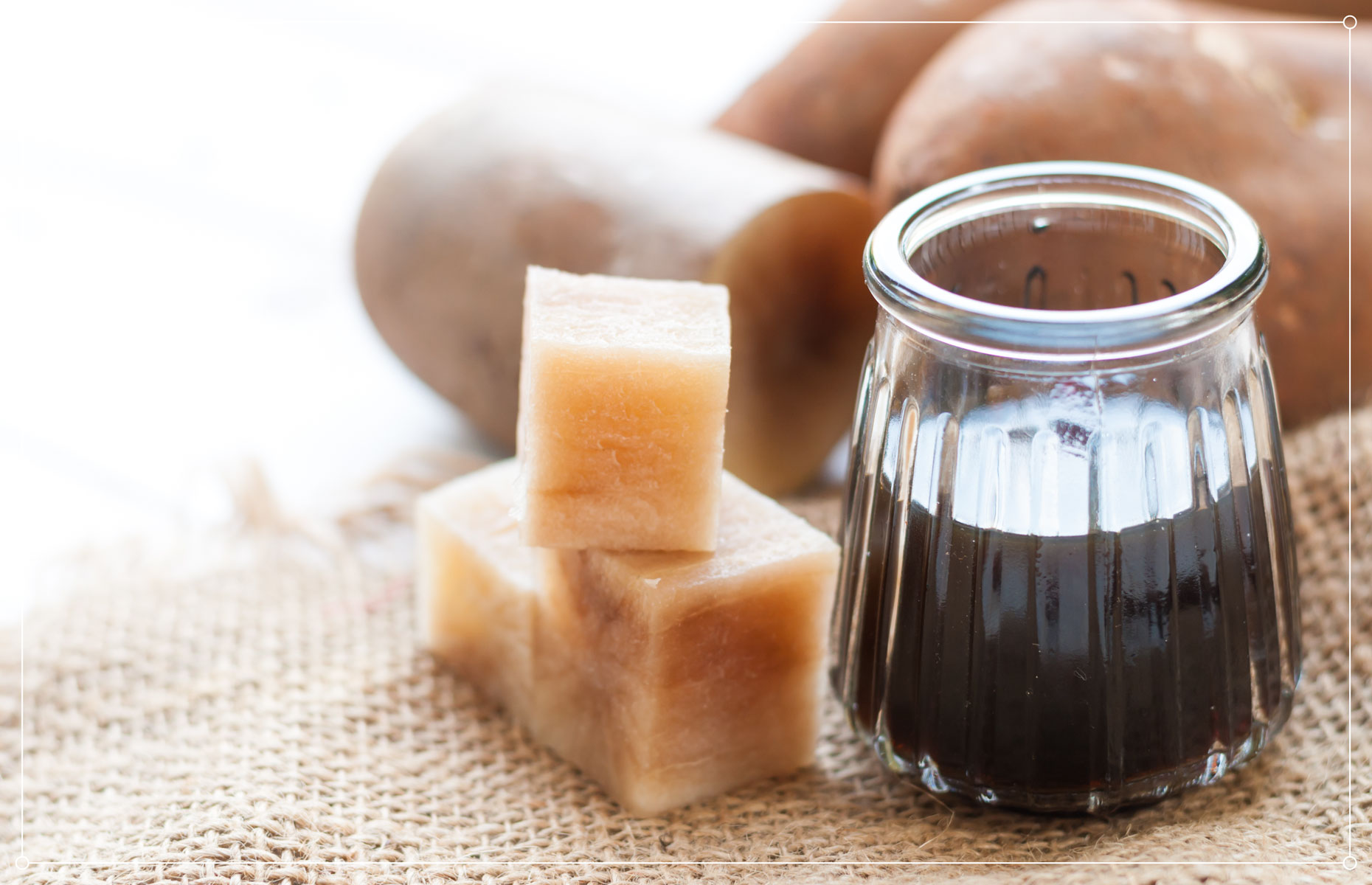
Yacon syrup is derived from the South American yacon plant, [19] whose roots contain sugars and antioxidants.
One of the main advantages of yacon syrup as a sugar substitute is the presence of fructooligosaccharides, which are soluble fibers that can potentially reduce inflammation [19].
While research on yacon syrup is still in its early stages, some studies suggest that it may make people feel more full or lose weight. [20]
Great for: Adding soluble fiber and antioxidants along with sweetness
7. Dates
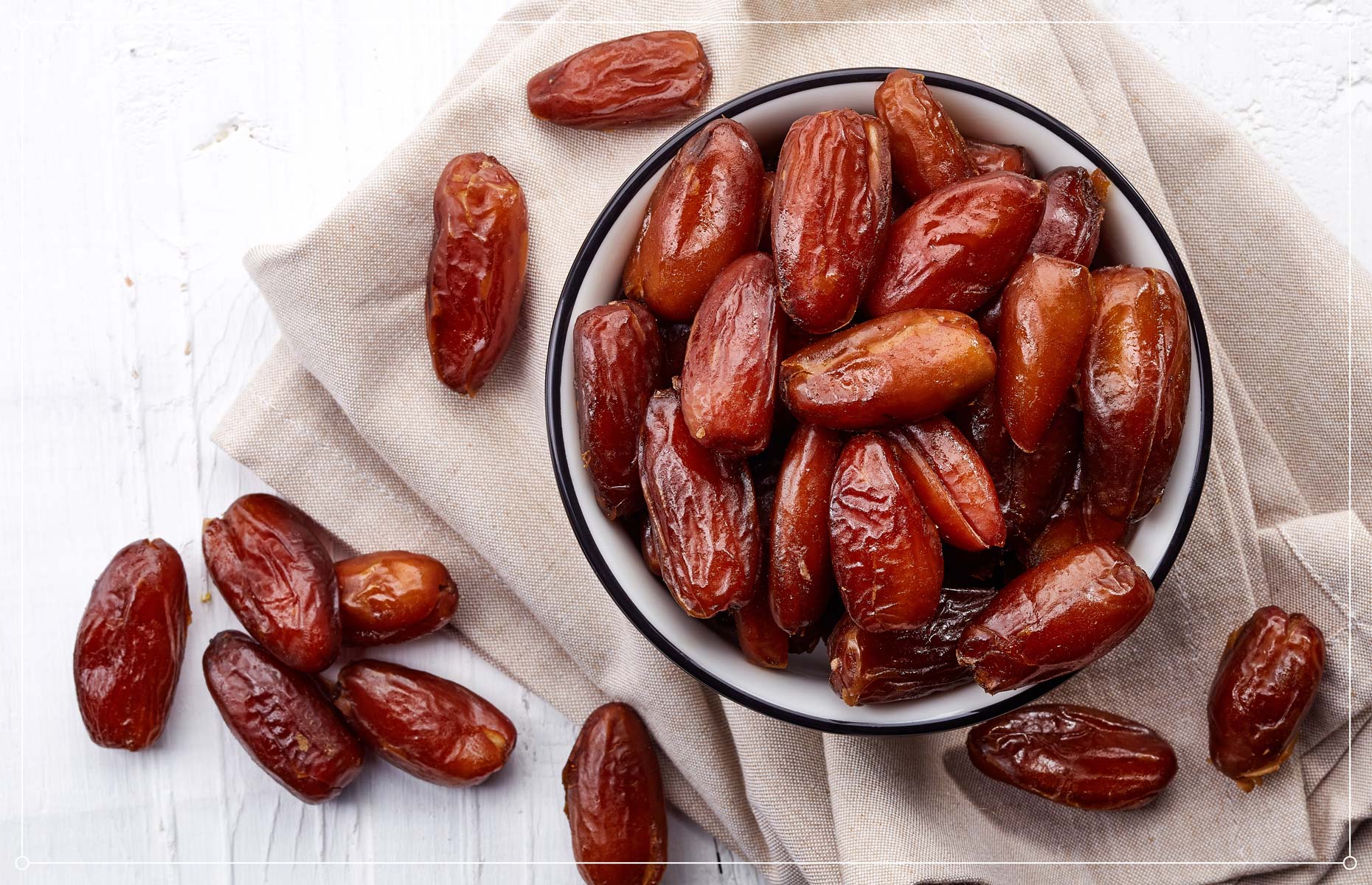
Dates come from a palm tree through a process of partial dehydration. While they are very sweet, they offer potential improvements over refined sugar since dates contain nutrients [21] like fiber, vitamin C, calcium, iron, and potassium.
Research suggests that dates may improve cardiovascular health. [21] Additionally, scientists [22] compared people who ate dates to those who ate none and found a decrease in total cholesterol.
Great for: Replacing sugar while potentially lowering total cholesterol
Are Natural Substitutes Like Honey, Molasses, and Maple Syrup Healthy?
While the word “natural” can make us immediately think “healthy,” a natural sugar substitute like honey may still increase HbA1c with daily usage according to researchers. [23]
Honey and sugar have a similar effect on blood sugar, [24] and honey contains more carbohydrates and calories per teaspoon than sugar. As a result, making a substitution for honey may actually be worse than sugar if you use the same amount.
Overall, for those seeking to reduce calories, carbohydrates, or blood sugar spikes, it may be best to choose other sugar substitutes.
How to Use Sugar Substitutes When Baking
While sugar substitutes can often be great alternatives to sugar when baking, they often can’t be interchanged on a 1:1 basis. Finding the right measurements for your recipe can be a challenge, as you have to account for different textures, quantities, and moisture levels.
Below we’ve shared printable kitchen signs that you can hang in your kitchen to use as a resource and for inspiration as you bake and cook. We’ve also created recipe cards that you can use to keep track of your favorite recipes and the best sugar substitutes to use with each.
Note that researchers have not yet studied the exact conversions for various sugar substitutes, so we offer this resource only as a starting place for you to find how alternative sugars may fit into your diet. We suggest that you consult with a physician for more specific recommendations about how sugar substitutes could interact with various medications or medical conditions.
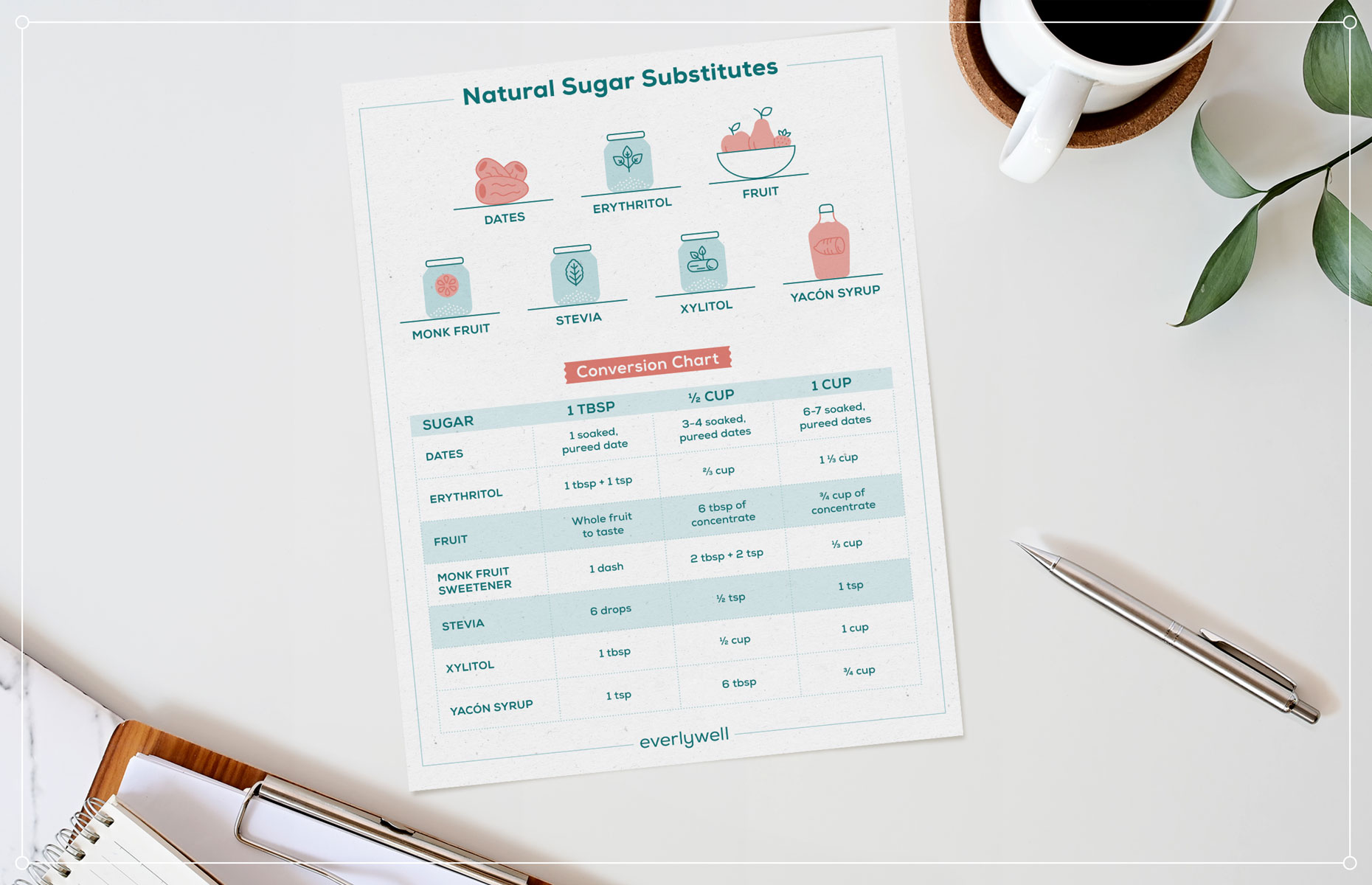
Important note: The below measurements are general suggestions. If you have any questions about sugar substitutes and your body, consult with a registered dietitian or healthcare provider.
Are Sugar Alternatives Actually a Healthier Option?
If you have a sweet tooth, sugar substitutes can be a reasonable alternative to table sugar, honey, and refined or processed sugars.
The consumption of added sugars in the United States continues to be above the recommended [25] level of total energy intake. The availability of added sugars and sugar-sweetened foods as well as the frequent consumption of these foods can pose serious health risks. Cutting down on added sugars, either by using non-nutritive sweeteners or avoidance, may help reduce the health risks posed by consuming too much added sugar.
Unsure how controlled your blood sugar levels are? Consider taking an at-home lab test to monitor your three-month average blood sugar levels and consult with a registered dietitian or your healthcare provider for individualized dietary advice.
[1] “National Diabetes Statistics Report.” Centers for Disease Control and Prevention, Centers for Disease Control and Prevention, 18 Jan. 2022. Accessed 2 February 2022.
[2] “Prediabetes: What Is It, Who's at Risk, Symptoms, Can It Be Reversed.” Cleveland Clinic. Accessed 2 February 2022.
[3] Weeratunga, Praveen, et al. “Per Capita Sugar Consumption and Prevalence of Diabetes Mellitus--Global and Regional Associations.” BMC Public Health, U.S. National Library of Medicine, 20 Feb. 2014. Accessed 2 February 2022.
[4] “Get to Know Carbs.” Get to Know Carbs | ADA. Accessed 2 February 2022.
[5] “What You Should Know about Sugar Alcohols.” Cleveland Clinic, Cleveland Clinic, 15 Apr. 2021. Accessed 2 February 2022.
[6] Storey, D., et al. “Gastrointestinal tolerance of erythritol and xylitol ingested in a liquid.” . Eur J Clin Nutr. Mar. 2007. Accessed 18 February 2022.
[7] Mäkinen, Kauko K. “Gastrointestinal Disturbances Associated with the Consumption of Sugar Alcohols with Special Consideration of Xylitol: Scientific Review and Instructions for Dentists and Other Health-Care Professionals.” International Journal of Dentistry, Hindawi Publishing Corporation, 20 Oct. 2016. Accessed 2 February 2022.
[8] Flint, Nir, et al. “Effects of Erythritol on Endothelial Function in Patients with Type 2 Diabetes Mellitus: A Pilot Study.” Acta Diabetologica, U.S. National Library of Medicine, June 2014. Accessed 2 February 2022.
[9] Gupta, Megha. “Sugar Substitutes: Mechanism, Availability, Current Use and Safety Concerns-an Update.” Open Access Macedonian Journal of Medical Sciences, Republic of Macedonia, 19 Oct. 2018. Accessed 2 February 2022.
[10] Castro, Regina. “Artificial Sweeteners: Any Effect on Blood Sugar?” Mayo Clinic, Mayo Foundation for Medical Education and Research, 7 Apr. 2021. Accessed 2 February 2022.
[11] Bundgaard Anker, Camilla Christine, et al. “Effect of Steviol Glycosides on Human Health with Emphasis on Type 2 Diabetic Biomarkers: A Systematic Review and Meta-Analysis of Randomized Controlled Trials.” Nutrients, MDPI, 21 Aug. 2019. Accessed 2 February 2022.
[12] Dreher, Mark L. “Whole Fruits and Fruit Fiber Emerging Health Effects.” Nutrients, MDPI, 28 Nov. 2018. Accessed 2 February 2022.
[13] “Diabetes Superstar Foods.” ADA. Accessed 18 February 2022.
[14] “Fruit.” ADA. Accessed 2 February 2022.
[15] Zeratsky, Katherine. “What to Know before You Juice.” Mayo Clinic, Mayo Foundation for Medical Education and Research, 9 Oct. 2021. Accessed 2 February 2022.
[16] “Additional Information about High-Intensity Sweeteners.” U.S. Food and Drug Administration, FDA. Accessed 2 February 2022.
[17] EFSA Panel on Food Additives and Flavourings (FAF), et al. “Safety of Use of Monk Fruit Extract as a Food Additive in Different Food Categories.” EFSA Journal. European Food Safety Authority, John Wiley and Sons Inc., 11 Dec. 2019. Accessed 2 February 2022.
[18] “Determination of the Generally Recognized as Safe (GRAS) Status of Siraitia Grosvenori Swingle (Luo Han Guo) Fruit Extract as a Food Ingredient.” FDA. Accessed 2 February 2022.
[19] Yan, Mary R, et al. “A Sustainable Wholesome Foodstuff; Health Effects and Potential Dietotherapy Applications of Yacon.” Nutrients, MDPI, 3 Nov. 2019. Accessed 2 February 2022.
[20] Genta, Susana, et al. “Yacon Syrup: Beneficial Effects on Obesity and Insulin Resistance in Humans.” Clinical Nutrition (Edinburgh, Scotland), U.S. National Library of Medicine, 28 Apr. 2009. Accessed 2 February 2022.
[21] Al-Dashti, Yousef A, et al. “Date Palm Fruit (Phoenix Dactylifera): Effects on Vascular Health and Future Research Directions.” International Journal of Molecular Sciences, MDPI, 28 Apr. 2021. Accessed 2 February 2022.
[22] Alalwan, Tariq A, et al. “Effects of Daily Low-Dose Date Consumption on Glycemic Control, Lipid Profile, and Quality of Life in Adults with Pre- and Type 2 Diabetes: A Randomized Controlled Trial.” Nutrients, MDPI, 15 Jan. 2020. Accessed 2 February 2022.
[23] Sadeghi F, et al. “Effect of Natural Honey on Glycemic Control and Anthropometric Measures of Patients with Type 2 Diabetes: A Randomized Controlled Crossover Trial.” Int J Prev Med. Jan. 2019. Accessed 18 February 2022.
[24] “Diabetes Foods: Can I Substitute Honey for Sugar?” Mayo Clinic, Mayo Foundation for Medical Education and Research, 15 Sept. 2021. Accessed 2 February 2022.
[25] Powell, Elyse S, et al. “Added Sugars Intake across the Distribution of US Children and Adult Consumers: 1977-2012.” Journal of the Academy of Nutrition and Dietetics, U.S. National Library of Medicine, Oct. 2016. Accessed 2 February 2022.

